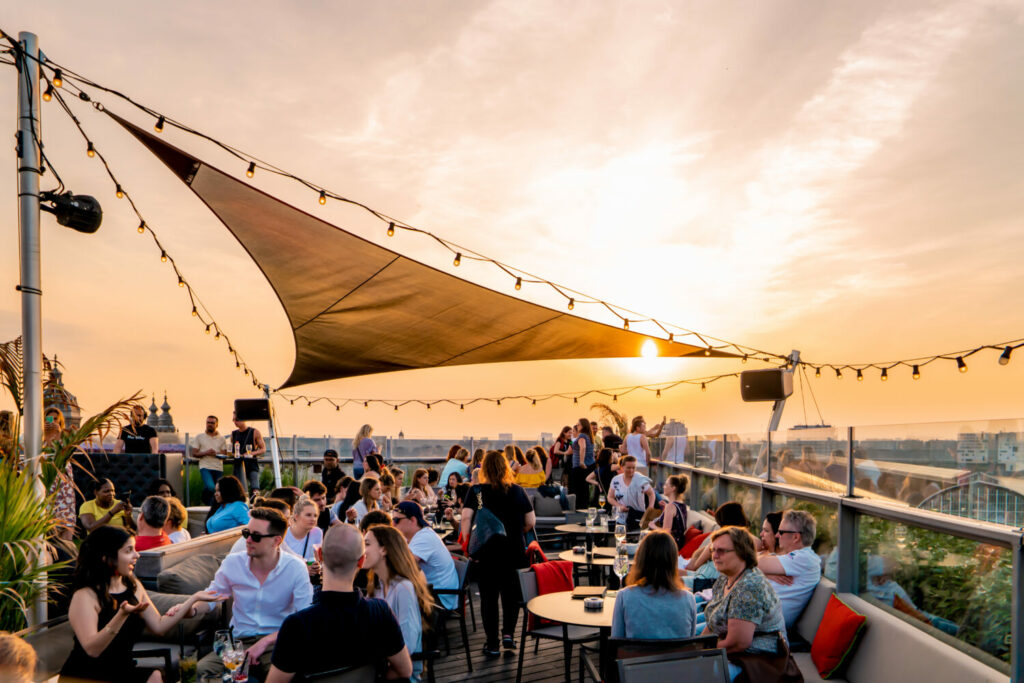How to open a bar
Opening a bar is a dream for many, and it’s easy to understand why. They can often be a great place to work and running a bar is a highly social and rewarding job, but it can also be quite the challenge.
As of 2023, there were over 27,000 pubs and bars in the UK, making it a very competitive industry.
There’s a lot of legal hurdles to jump over and it can be financially tough to keep a bar going so it’s important to be prepared so your business can succeed.
Here’s our top tips for how to open a bar:
Choose a great location

Choosing a location is dependent on multiple factors. Target audience, your price range, and competition are all factors to consider.
For example, if your intended audience is young professionals, opening a bar in the business district of a big city is likely to draw in a lot of footfall. Similarly, if your business is targeting students, opening near a university campus or near the local nightlife is also a good choice.
Price range is also a factor to consider, as your overheads will be reflected in how much your prices cost. Higher rents and business rates will need to be offset by more expensive products, so bear this in mind when choosing a location.
Other competing businesses are also a factor to consider. However, opening near similar bars is not always a bad idea. People love to crawl from location to location so opening near other venues with a similar audience can be an effective way of bringing in more footfall.
Read more: What should I be aware of before signing a commercial lease?
Know your audience
Before opening your bar, it’s important to know exactly what kind of bar you plan to open.
The beauty of opening a bar is you have so many options. Are you going for somewhere quiet for a couple of after work drinks? Or maybe somewhere for some late night dancing? Bars can range from anywhere between a classy rooftop establishment to a dingy dive bar tucked away in an alleyway.
It doesn’t matter what you choose, so long as you know what kind of audience you need to prepare for. This will have an impact on a number of factors, such as drink choice, decoration, and service type.
For example, a sports bar will most likely sell plenty of beer on tap, with the room full of televisions, and a large bar space to make light work of lots of orders coming over the counter.
In contrast, a fancier establishment may have a wider menu of wines and cocktails, plenty of comfortable seating, and waiting staff tending to each table.
Fit out your bar
Once you’ve selected and secured your location, it’s time to set up. The most enjoyable part of this process will probably be picking furniture and interior decorations, but ensuring you have the right tools for the job is just as important.
Equipment such as fridges, glass washing machines, and coffee machines (if applicable) will need to be purchased and installed.
If you’re running drinks through any taps, you’ll need a place to store kegs, coolers, and line cleaning facilities. These can take up a lot of space, so are another factor to consider when choosing a location.
Your business will also require point-of-service (POS) devices. Dependent on how busy you expect your bar to be and how you intend to operate it, how many POS points you install will depend. Some bars which operate table service will have a till point on the floor so waiting staff can punch in orders on the go.
All of these appliances are expensive and will require professional help to install, so take care to ensure you’ve made the right preparations.
Secure the right licenses

You’ll need to secure a premises licence before you can even think about selling alcohol in a bar. Without this, you can’t open.
You must apply to your local council for a licence, who will decide whether or not your business can sell alcohol. They will consider a number of different factors, such as the location of your bar and its opening hours.
As well as a premises licence, you, and any managers or supervisors, will need to ensure you have a personal licence. It is against the law to sell alcohol at any business without a licence holder present. These are typically obtained through a short course, usually around £100.
Other licences to consider include music licences, food licences, and live sports licences, if relevant to your business.
Choose the right staff

A business is no good without staff to run it! So ensuring you’ve got the right team members can be key to the success of your bar.
Many young people will take on bar jobs with little to no experience, so employ some staff who know their way around a bar. They can help ensure new staff get up to speed and everything runs smoothly.
Bar staff should be friendly, charismatic, and high-energy, but it’s also helpful to have people around who can give a stern telling-off to problematic patrons!
Market your business
Once your bar is open – it needs customers! This will begin with your marketing, which should begin before your business launches.
Social media is a great tool for start-up businesses as you can reach a wide audience quickly. Try to make use of apps such as Instagram, TikTok, and Facebook to drum up a buzz around your opening.
Word-of-mouth is an age old way to generate excitement for the opening of your bar, so let your friends and family know all about your business and get them to spread the word.
Once you’re open, it’s important to keep up your marketing efforts. If you have any events coming up or any deals on it helps to shout about it, and it’s a great way to ensure that people coming back.
Read more: How to advertise your business.
Being prepared when opening a bar can give you a head start to creating a successful business.
No advice is substitute for a good atmosphere and quality customer service, however! Ensuring an enjoyable experience for your customers is the best way to keep people coming back.
Ready to find the perfect spot for your bar? Check out retail units to let here.